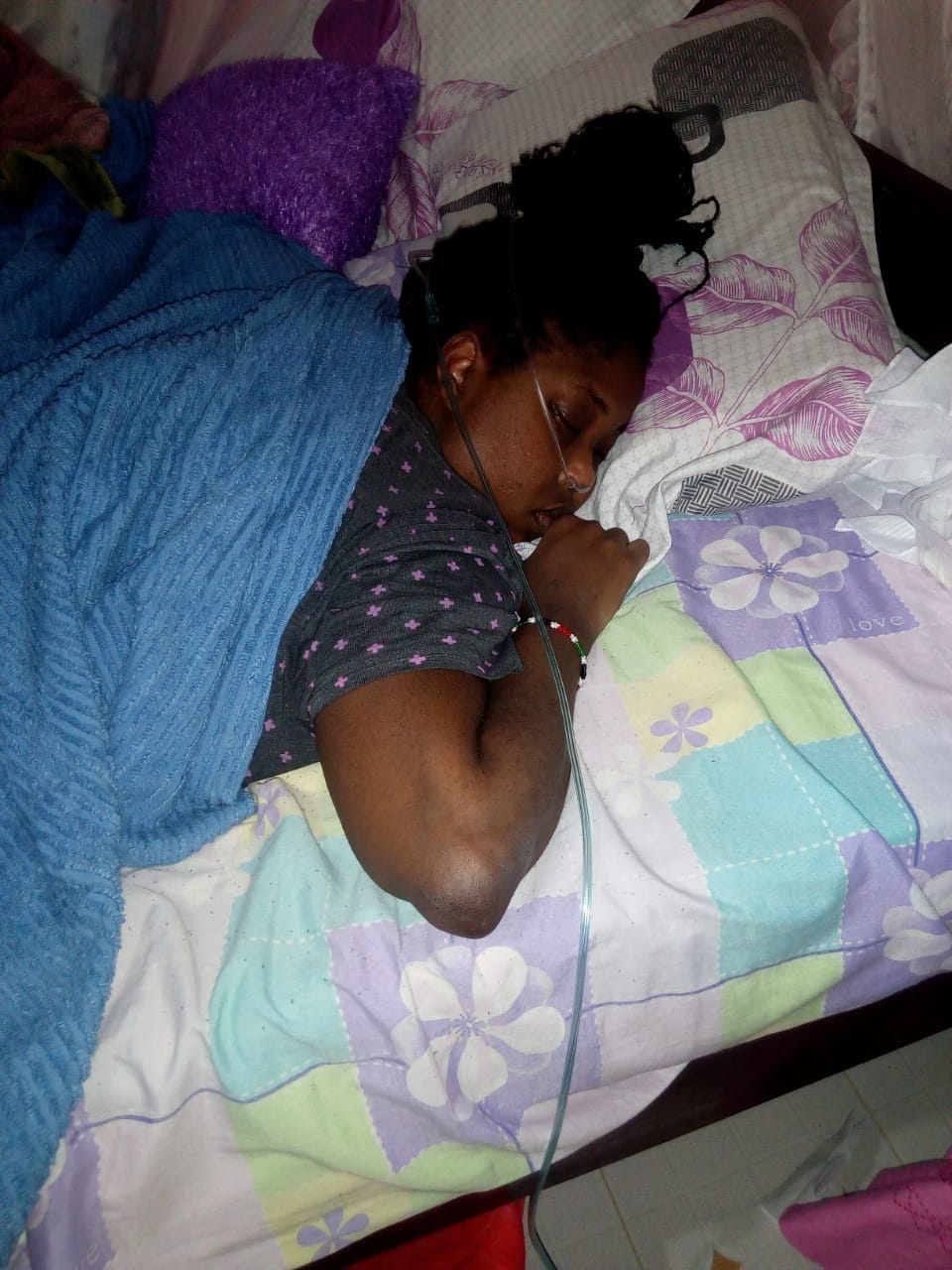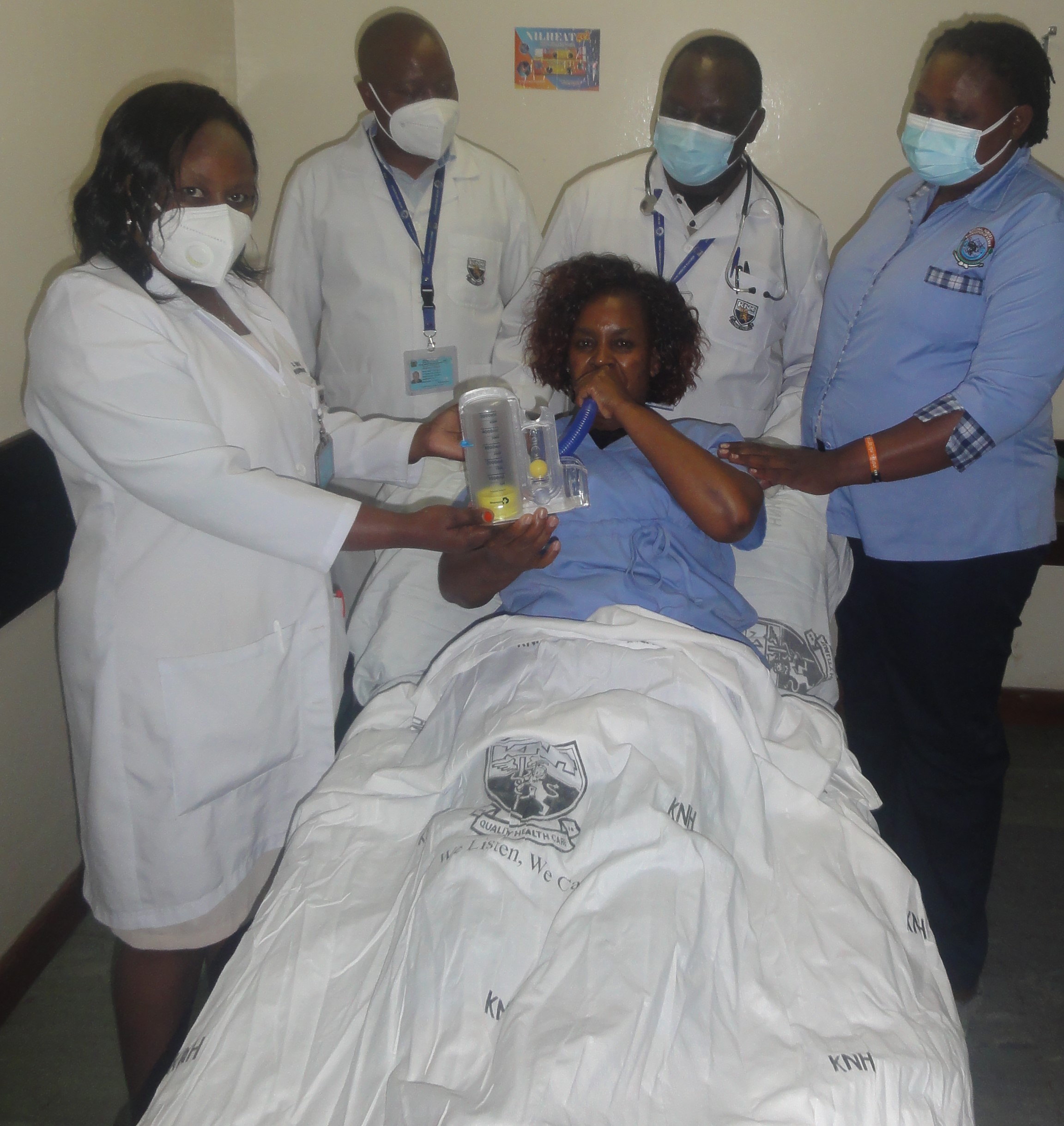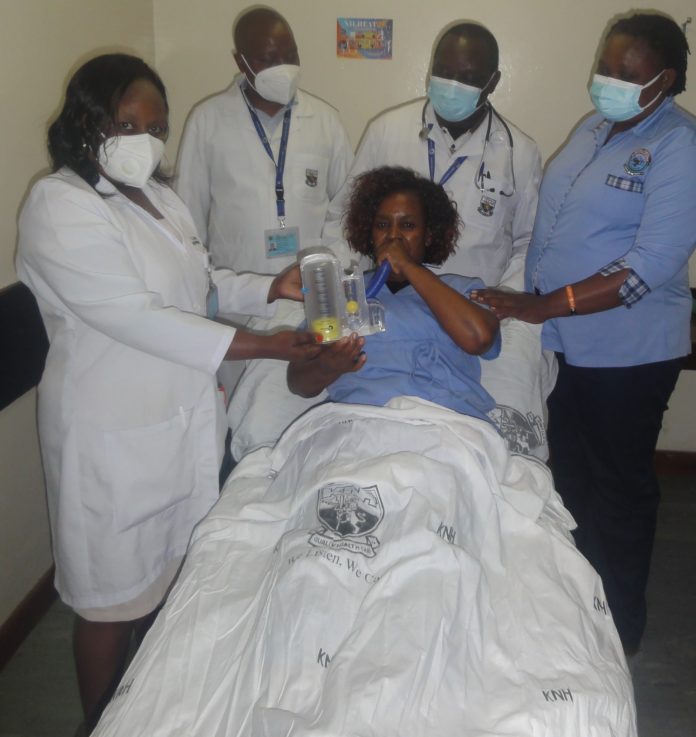By Wahinya Henry
Nairobi, Kenya: Mercy Wairimu was in deep thought inside the ambulance in which the daughter lay motionless but alive due to the support the oxygen ventilator offered.
She came back to her senses as the ambulance from Belleview Hospital in South C in the city.
Her attention was caught by the flurry of fleeing neighbors as the ambulance, sirens in full blare, came to halt in the compound.
Neighbors scampered for safety at the sight of the arrival of the Kenya Agricultural Livestock Research Organization (KALRO) staffer at the sight of the arrival of the ambulance bringing home COVID- 19 patient Joy Wambui Gichuhi.
The stigma was instant. Wairimu was abandoned by neighbors.
A team of physiotherapists accompanying the patient to continue with home-based care after she was discharged from the hospital came in handy.

It assisted get the twenty-five-year-old forth Year University of Nairobi and Utalii College Bachelor of Arts in hospitality management, Joy Wambui, and the mother of the ambulance.
Joy was wheeled into a bedroom designed to look like a ward, a king-size gas cylinder hired at a cost of Sh.54, 000 besides her and fitted with a huge oxygen mask to facilitate breathing.
The dash out of the compound and craned necks of tenants peeping through half-closed winder curtains baffled Wairimu who had visualized a teary population would turn up to receive them.
“What we got was the stigma. Expected help from the neighbors and relatives was false hope,” explained Wairimu, firmly holding a heap of paid receipt bills to the tune of millions of shillings.
A victim of COVID-19 herself, who recovered faster than the daughter was left Sh2.7 million poorer but still owed the hospital Sh600, 000 the management told to go home and pay later.
Two bottles of drug tocilizumab of 400 mg each cost KSh400, 000 used to help in the drip process. “Besides the cost, the drug was not available until the third day,” says Wairimu whose bill rose due to drugs, transport costs, and the special nutritional diet recommended under the home-based care program.
Head of Kenya Hospital Physiotherapy Unit, Kennedy O. Mogire says medical and hospital treatment makes treatment more expensive compared to physio treatment or services.
According to Mogire, affordability is dependent on individuals and the price of physiotherapy treatment varies from KSh300 per session in some county hospitals to KSh6,000 to KSh10,000 in some private institutions and clinics offering specialized individualized treatment to clients.
Gikomba trader Isack Kimani suspects he got infected by interacting with customers and traders.
For two weeks Kimani was pumped with oxygen to facilitate breathing at Belleview and drugs, apart from other expenses to the tune of KSh1.3 Million.
Mogire says KNH is quite fair in the pricing of KSh 650 first visits and KSh500 every other visit and for private patients like private referrals is KSh975 first visit and KSh750 every other visit.
“There is also a category for East African patients and foreign patients who pay KSh1, 200 first and KSh1,000 every other visit.
Tribulations of the daughter who was at Belview ICU section from April 18 and discharged on May 13 began in early April.
She resorted to self-treatment after craving for pain killers to solve body pains and breathing difficulty before getting admitted after Kenyatta University referred the patient to the Belleview
“The hospital was kind to us. I was told to go home and pay any amount that comes my way,” explains Wairimu, breaking into a slight smile, as she recalls the first TV set she bought on a higher purchase term.

Lorna Mbesa Masila, a Kenya Medical Training Centre trained physiotherapist based at Belleview Hospital is in the profession by chance and wonders at the turn of events following the outbreak of the pandemic.
“I wanted to train as a nurse. But high schoolmates convinced me to take up physiotherapy. It was less taxing as a course associated with physical exercise,” explains Lorna saying the bill would have been higher was it not for physiotherapy treatment, adding:
“The idea of home-based physiotherapy treatment assist by us comes in handy after hospital discharge. The high number of inpatients admitted and outpatients have kept physiotherapists on toes in COVID- 19 times.”
Home-based treatment Lorna offers patient Wambui, range from assisting and offering techniques to use gadgets like oximeter that assists aids in breathing at home instead of remaining in a ward set up.
Physio treatment says Lorna is carried out besides regular exercises patients are at the risk of suffering from blood clots after a long stay in bed and muscle is wasted.
“Presence of a physio in COVID -19 times is critical. Patients require lungs to be oxidized regularly. Our presence has become mandatory,” says Lorna, as medical doctor Esther Mumbua chips in:
“In the hospital, doctors work closely with physiotherapists. Doctors give the medicine. Physios actualize the exercise to enlarge the lungs to aid in recovery after collapse.”














